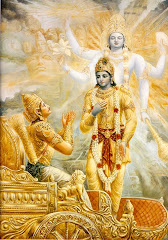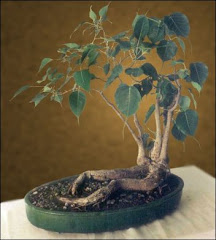
According to an old joke, when Mao Tse Tung (1893–1976) was asked what had been the consequences of the French Revolution (1789–1799), he replied that it was too early to tell.
Elsewhere the 'Master Blaster' has been given a friendly advice by the 'Master Plaster'... to 'keep off the political pitch' for his own well-being. In response to the cricket maestro's comments a few days back... that 'Mumbai belongs to all'.
Bengalis have a reputation for being 'aantels' or intellectuals and social reformers. But they have a great sense of humour too. Infact, they have the ability to find humour in the most mundane of circumstances and events.
In West Bengal which is governed by the CPI(M) for over 3 decades... the Congress party occupies the opposition benches. Folks there, call the congressmen "tormuj"... meaning "watermelon". Watermelon is red inside... isn't it... ?!! You get the drift... ???
Jyoti Basu - the former Chief Minister (CM) of W. Bengal, and the longest serving CM in India was called 'Mouda' or 'Mou jethu'... in his home province. During his last stint... he went on a 'Memorandum of Understanding' (MoU) signing spree... with all possible countries. For which he would emulate Sindbad of course. "Da" is an abbreviation of "dada" meaning "elder brother" in the Bengali language. While "jethu" (abbreviation of "jetha moshai") means "father's elder brother".
The story goes like this. One day, a young man traveling in a fairly crowded bus... was conversing with his friend sitting next to him. They were referring to Mr. Basu as "Mouda". After a while, an elderly fellow commuter... sitting a few rows behind them protested. He lectured them on the decadence of the youth vis-a-vis respect shown towards elders. He ended by rebuking the young men for referring to Mr. Basu... a senior citizen... as "Mouda". And asked them to call him "Mou jethu" instead... since he was older than their father.
Jyoti Basu during his tenure as CM had been to China on an official visit. One day, during lunch - for the fish course - he was served the 'koi mach'. Now, the 'koi mach' is able to live out of water for protracted period and does not die easily. There is a colloquial saying in Bengali: "koi macher pran" (tr: as difficult to kill... like the koi mach.)
So, when Mr. Basu was served this fish... to his amazement and much consternation... he found them moving... on his plate. His Chinese hosts were already eating... infact relishing this fish. I hope you are aware that in the oriental culture... refusing any food offered by the host is taken as a sort of snub/insult. Plus, as we all know... the CPI(M) loves to play 'Chinese Checkers'. So... who says politicians have an easy life... ???
Meanwhile, his successor had been to Japan recently... again on an official visit. Ostensibly to encourage investments. Once there, he confidently proclaimed... "we have surplus power and can export it too." Wonder which 'power' he was talking about, though.
"Buy land," Mark Twain advised us, "they don't make it any more." They don't, and that's why it's so expensive. In Bangalore/Bengaluru, as in cities around the world, few people own land and only the richest can actually buy it. Most people live in apartments, and one/two-bedroom flats are the standard home for India's middle class. Over the last 15/18 years (after Manmohan Singh initiated the contemporary phenomenon called 'liberalization')... the definition of middle class in India has grown elastic and it can now accommodate families of five/six that make Rs. 25/30 K a month and families of two/three that make Rs. 5/6 lakh a month.
The best palace in India is the Falaknuma, built in 1893-94, on the outskirts of Hyderabad, and now a Taj Hotels property. It is a stupendous palace and connotes the idea of "heavenly abode".
It wasn't built by the Nizam (ruler), but by his prime minister, H.E. Nawab Sir Vicar-ul-Umra, Khan Bahadur, Secundar Jung, KCIE, Kaiser-i-Hind. It has over 200 rooms and is built entirely of Italian marble. European architecture doesn't normally suit India because our weather is warm. Heavy Teutonic or ornate and gilded French-style buildings look out of place here. But the open and light Mediterranean style of Italy is perfect and that is how Falaknuma was designed. Infact, this palace is a rare blend of Italian and Tudor architecture. Its glass stained windows throw a spectrum of colours into the rooms. Falaknuma literally means "Star of Heaven" in Urdu. It has often been referred to as the 'Mirror of the Sky'. The Vicar-ul-Umra was the fifth Amir of a noble family, the Paigahs, and was the maternal grandson of Mir Akbar Ali Khan Siddiqi Sikander Jah Asaf Jah III - the third Nizam.
The Falaknuma palace has other unique things to its credit. It includes the largest Venetian chandeliers. It is said that it took six months to clean a 138-arm Osler chandelier and the palace has 40 such chandeliers adorning the halls! The famed table in the dining hall accommodates 100 guests at one go! The story is that... the palace took nine years to make. It covers a total area of 9,39,712 square meters and is situated on a hill... 2000 feet high. And on the night it was inaugurated, the Nizam, who was invited, told his prime minister on leaving the party that he loved it. Noblesse oblige, and the poor Vikar-ul-Umra handed the Nizam the keys and walked away.
This was the sixth Nizam, the dashing His Highness Fateh Jang Nawab Mir Sir Mehboob Ali Khan Siddiqi Bahadur, Kaiser-i-Hind, Asaf Jah VI (1869-1911.) His son, the seventh and last Nizam, His Exalted Highness Fateh Jang Nawab Mir Sir Osman Ali Khan Siddiqi, Faithful Ally of the British Government, Asaf Jah VII (1911-1967), was the richest man in the world... having a fortune estimated at $2 billion in the early 1940s. But he had a poor reputation among his people and was thought to be not just a miser, a kanjoos, but also a coward.
The ditty about father and son was: 'Mehboob Ali Pasha sher ko mara/Osman Ali Pasha plague se bhaga'.
Mehboob Ali Khan was well known for his lavish lifestyle and luxuries, and had an enormous fascination for clothes and cars. His collection of garments was one of the most extensive in the world at the time, with sherwanis, shirts, coats, collars, socks, shoes, headgear, walking sticks, perfumes - not one each, but dozens of almost each item. He devoted a whole wing of his palace to his wardrobe and would never wear the same dress twice.
He bought the Jacob Diamond, which stands out among the Jewels of The Nizams now owned by the Government of India. Unlike the famous Koh-i-Noor, the Jacob diamond can be branded as a 'nonviolent diamond', one which has changed hands only twice in the history of its existence. It was several years after the death of his father that the last Nizam, Osman Ali Khan, found the Jacob Diamond in the toe of his father's shoe at Chowmahalla Palace. Nevertheless, the Nizam still showed little interest in the diamond and for many years it was used as a paper weight by the last Nizam. This continued until the diamond's true value was realized and it was stored away as another of the Nizam's treasures.
Having large houses does not mean that one becomes refined. The Nizams had relations with Muslim nobility and Osman's son His Highness Azam Jah (1907-1970) was married to the Turkish Caliph's gorgeous granddaughter, Princess Durr-e-Shewar (daughter of Abdul Mejid II, the last Ottoman Caliph and cousin and heir of the last Sultan of the Ottoman Empire.) One morning, an emissary from Istanbul arrived in Hyderabad and was led to the Nizam, who was sitting in a corner in his usual tattered robe, knitting socks. The puzzled emissary looked at the courtier, who confirmed: "Een Shah-e-Dakhan ast" (tr: this is the king of the Deccan.)
- "Panah bah Khuda," muttered the Persian (tr: God help us.)
Osman's other son His Highness Moazzam Jah married Princess Niloufer, a princess of the Ottoman Empire. It has been suggested that through these dynastic unions... of one of the richest ruling Muslim families with the impoverished and exiled House of Osman (the administrative House of the Caliphs), the seventh Nizam of Hyderabad hoped to acquire the Caliphate for his descendants. In total, Osman Ali Khan sired at least 40 children. He had seven wives and 42 concubines. *Ahem! Ahem!*
The Falaknuma palace is laid out in the shape of a scorpion with two stings spread out as wings on the north. However, the palace has proved to be fatal to those who have resided there for a long period. The scorpion-like structure is believed to be the cause of all deaths. Ummm... the makers of the 'Mummy' movie series may want to look at it for 'inspiration'. What say... ???
The first Nizams ruled on behalf of the Mughal Emperors. But, after the death of Aurangazeb, they split away from the Mughals to form their kingdom. When the British achieved paramountcy over India, the Nizams were allowed to continue to rule their princely states. They retained power over Hyderabad State until September 1948 when it was integrated into the Indian Union. The Asaf Jah dynasty had only seven rulers.
A legend about the first Nizam states that, on one of his hunting trips he was offered some kulchas (an Indian bread) by a holy man and was asked to eat as many as he could. The Nizam could eat seven kulchas and the holy man then prophesied that seven generations of his family would rule the state. The Nizams, by an honoured Hyderabad tradition that no Nizam has ever left India no matter how good a reason might exist for doing so, believed, "the Sovereign is too precious to his people ever to leave India."
John Major (a former Prime Minister of the United Kingdom and former Leader of the Conservative Party) left school at age 16 in 1959, with three O-levels: History, English Language and English Literature. He later gained three more O-levels by correspondence course, in the British Constitution, mathematics and economics. When pressed about his precise qualifications shortly after becoming Prime Minister, he answered that he couldn't remember what he had attained.
Perhaps... 'inspired' by him, Sarah Palin's greatest admirer in this part of the world said, "I do have a degree. That is not an issue. I attended the London School of Business Studies much before I was married. I think it's a B.Ed degree. I haven't really looked at it."
When Nawaz Sharif was imprisoned in the Kot Lakhpat Jail (or maybe the Adiala or the Attock jail) after Gen. Pervez Musharraf staged a dramatic coup d'état against his government (in Oct., 1999)... Nawaz was kept in a darker corner of the jail. Tired of mosquito bites, etc... he sent a request to another fellow prisoner... Asif Ali Zardari... whether he could shift to his part of the jail. Zardari responded with a note stating: "I have no problem. I am used to sharing beds with Prime Ministers." It is another matter altogether that Nawaz was unable to stomach an 'ordinary' jail and preferred to wing his way to Saudi Arabia and live in a 'gilded cage' (read: the Al-Saroor Palace in Jeddah) instead. He had signed documents commuting his prison sentence in exchange for staying out of the country... for 10 years - an 'exile deal'. He obviously doesn't like to "slum it" and must be no fan of "Slumdog Millionnaire" either. Undoubtedly!
On being asked... if he ever felt that Benazir Bhutto was out of his league, Zardari replied. "I imagined myself as a knight in white armor." (He habitually muddles clichés.) "I don't think I fathomed what she was until I married her. I just couldn't grasp the... giganticness of her personality," he added. "There is a saying in my language: 'The camel only finds out that there is something taller than him when he comes beneath a mountain.'"
- ''You must understand the environment in Pakistan. This has become a money-making concern. A lot of people say if you want to go abroad and get a visa for Canada or citizenship and be a millionaire, get yourself raped." Pearls of wisdom... by Pervez Musharraf aka the erstwhile supermodel of the very exclusive 'Bushshirt'. Spoken like a true statesman. What... ???
In 1986, German tennis legend Boris Becker (nicknamed: "Boom Boom", "Der Bomber", "Baron von Slam" and "The Lion of Leimen") successfully defended his title against another tennis great Ivan Lendl, efficiently knocking him off in three sets: 6-4, 6-3, 7-5. "I saw a little bit in Ivan's face that he didn't know what to do with me," Becker told a Sports Illustrated reporter. At that point, reporters could still write that no mortal man could beat Becker, who had only lost his first Wimbledon competition because of an injury. He was still the golden boy of modern tennis. Lendl was nicknamed: "The Terminator" and "Ivan the Terrible". A typical Lendl quote is: "If I don't practice the way I should, then I won't play the way that I know I can."
The next year, 1987, put a little tarnish on the Becker shine. The unthinkable happened: he lost in the second round at Wimbledon to an unknown, Peter Doohan. The press began to savage him. "I didn't lose a war. Nobody died. Basically, I just lost a tennis match," commented Becker, but he was shaken by the harshness of the attacks. This remark from the teenaged Boris Becker was probably the most sensible remark made by a beaten tennis player.
If some were expecting to see the Four Horsemen of the Apocalypse galloping through the picnic area of Melbourne Park on Monday night (25th Jan., 2009) after Andy Murray's fourth-round defeat at the Australian Open to Spain's Fernando Verdasco, then the Scot was not one of them. At the first grand slam of the year, post-match Murray was thinking along similar lines to the young Becker. For Murray, this was "not a disaster", this was not an Aussie Apocalypse and nobody died out there. It was just one of those days when an opponent is on top of his game and plays a better match, as Verdasco has never served as well as he did to come back from losing the first set and then from being two sets to one down.
Here is a hilarious video of German tennis legend Steffi Graf being propositioned by a boy while she was getting ready for the serve. The whole stadium erupts in laughter on hearing this. Do watch out what Steffi replies... (Video link.) The main weapon in Graf's game was her powerful inside-out forehand drive, which earned her the moniker "Fraulein Forehand". She often positioned herself in her backhand corner, and although this left her forehand wide open and vulnerable to attack, her court speed meant that only the most accurate shots wide to her forehand caused any trouble. Her blistering forehand was called 'Jaws' - after the giant great white shark - in the 1975 American horror/thriller film directed by Steven Spielberg .
(Stay tuned...)
Just liked the pic... kinda signifies "Dimag ki batti jala de". Right... ?!!
















